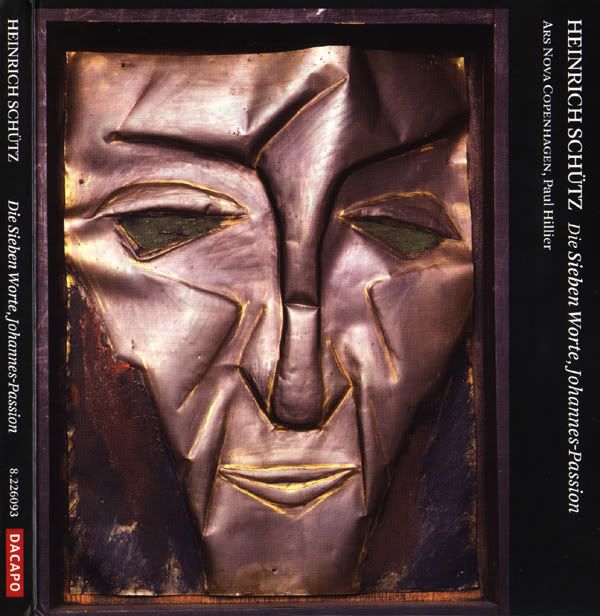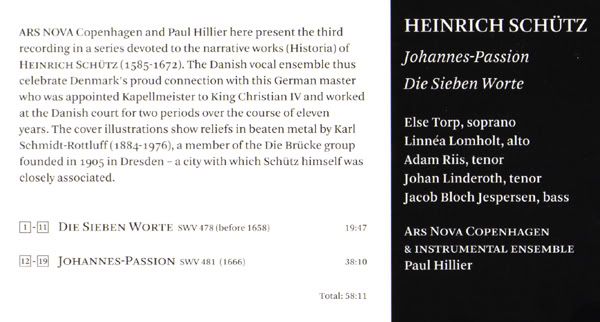 |
|
Heinrich Schutz (1585 - 1672)
Die Sieben Worte, Johannes-Passion
Label: DACAPO, 8.226093
Year: 2009
Performers:
Jakob Bloch Jespersen - bass
Johan Linderoth - tenor
Linnea Lomholt - alto
Adam Riis - tenor
Else Torp - soprano
Ars Nova Copenhagen
Paul Hillier - conductor
The three passion settings of Heinrich Schutz, all written in 1666, constitute an intermediate step between the traditional medieval plainchant settings and the elaborate choral passions of Bach. Overall they are closer to the former than the latter, in both structure and forces required for performance. The text consists only of the Gospel narrative without poetic reflections and interjections from other sources; the Evangelist narrator and Jesus dominate, with choral parts limited to the introductory title and the turba exclamations of the throng; the entire text is still sung a cappella without instrumental accompaniment. However, the vocal lines that Schutz writes for the two protagonists are far more varied in inflection than the traditional chant, aimed at amplifying the meaning of the text, while the choral parts leave chant behind altogether for polyphonic part-setting. Finally, the texts are sung in the vernacular instead of Latin. Because of their length and the predominance of solo narrative, which places a premium upon a fluent understanding of German, they remain perhaps more of an acquired taste than Schutz’s many motets and sacred concerti for solo and concerted voices. Certainly they have fewer recordings; the Johannes-Passion may appear the most frequently on disc simply by virtue of being significantly shorter than the settings drawn from Matthew and Luke, and thus both easier to digest and to pair with recordings of other works.
Here, the very logical filler is Schutz’s Die Sieben Worte (The Seven Words), a catena of the Biblical texts of Jesus’ words from the cross. Paradoxically, despite being an earlier composition (prior to 1658), it is closer in style to the later Baroque oratorio. The choral introduction and conclusion set texts of Protestant hymns, and are respectively followed and preceded by instrumental interludes; the voice of Jesus is accompanied by two instruments, anticipating Bach’s technique in the St. Matthew Passion; and the part of the Evangelist is assigned to more than one solo voice, with some lines even sung by a vocal quartet.
This is the third disc of music by Schutz released by Paul Hillier and the Ars Nova Copenhagen on the Dacapo label. J. F. Weber highly praised both previous outings: the Lukas-Passion in Fanfare 33:2, and the combined Weihnachtshistorie and Auferstehungshistorie in 33:5. Comparing the former to the recording by Matteo Messori in the ongoing Heinrich Schutz edition being issued by Brilliant Classics, he preferred "Hillier’s subtler approach" to Messori’s "more forceful interpretation" and also remarked that Hillier’s 1983 recording of the Matthaus-Passion was "notably lighter and more delicate than anything heard before." (Hillier has now rerecorded this work for Dacapo for future release.) Weber has captured the matter perfectly; transparency and gracefulness are hallmarks of these excellent renditions. While several alternatives-Messori, Kargl (Preiser), Zobeley (Aeolus), and the one-singer-per-choral-part Freiberger (Christophorus)-are good, I would call this a first choice. (The once venerable but now anachronistic Ehmann on Cantus, and Flamig on Berlin Classics, are markedly inferior.) Also, the recorded acoustic here is preferable; the Messori and Kargl have a much more reverberant acoustic that makes this intimate music sound rather heavier. The Messori does have a great advantage in price, offering all three passions and the Auferstehungshistorie in a four-CD set for little more than the cost of this CD. Adam Riis and Jakob Bloch Jespersen are both excellent soloists, though the former occasionally shows strain in his top notes; some of the singers of the tiny comprimario roles are of lesser quality than could be desired, but this is an all too common affliction in recordings of Passion settings by many composers. The rendition of Die Sieben Worte is likewise the best I have ever encountered, with singing and instrumental playing of great refinement and expressive intensity. Texts and translations are provided, and cueing points are generous. For all who love the music of Schutz-it is particularly dear to me-this release is highly recommended.


| SPOILER (LOG FILE) |